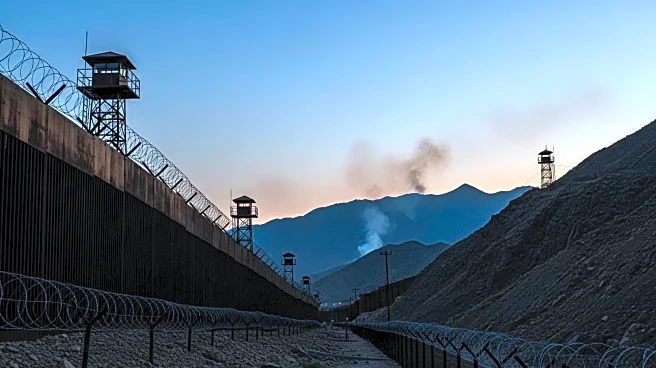What's Happening?
Afghanistan has announced that it killed 58 Pakistani soldiers during overnight border operations. This action was taken in response to what Afghanistan claims are repeated violations of its territory and airspace by Pakistan. The Taliban government's chief spokesman, Zabihullah Mujahid, stated that Afghan forces captured 25 Pakistani army posts and wounded 30 soldiers. The operations were described as retaliatory and successful by the Afghan Defense Ministry. Pakistan has not confirmed the casualties but has previously conducted strikes inside Afghanistan, targeting alleged militant hideouts. The border tensions have led to the closure of key trade routes between the two countries, including the Torkham and Chaman crossings.
Why It's Important?
The escalation of border tensions between Afghanistan and Pakistan could have significant implications for regional stability. The closure of major trade routes may impact economic activities and exacerbate humanitarian issues, particularly for Afghan refugees. The conflict also highlights the fragile security situation in the region, with both countries accusing each other of harboring militants. The involvement of Saudi Arabia, which has called for restraint and dialogue, underscores the international concern over potential escalation. The situation may affect diplomatic relations and security policies in South Asia, influencing how neighboring countries and international stakeholders engage with Afghanistan and Pakistan.
What's Next?
The ongoing border conflict may lead to further military engagements if tensions are not de-escalated. Afghanistan has stated its readiness to defend its borders against further violations, suggesting that military actions could continue. Diplomatic efforts, such as those encouraged by Saudi Arabia, may play a role in reducing tensions. However, the lack of recognition of the Durand Line by Afghanistan complicates border negotiations. The international community may increase pressure on both nations to resolve their disputes peacefully, potentially involving mediation or peace talks.
Beyond the Headlines
The border conflict between Afghanistan and Pakistan may have deeper implications for regional geopolitics. The historical dispute over the Durand Line remains a contentious issue, affecting bilateral relations. The involvement of Saudi Arabia, particularly its defense pact with Pakistan, could shift power dynamics in the region. Additionally, the conflict may influence the internal politics of both countries, as leaders navigate public sentiment and military strategies. The humanitarian impact, especially on refugees and civilians in border areas, could lead to increased international aid and intervention.











